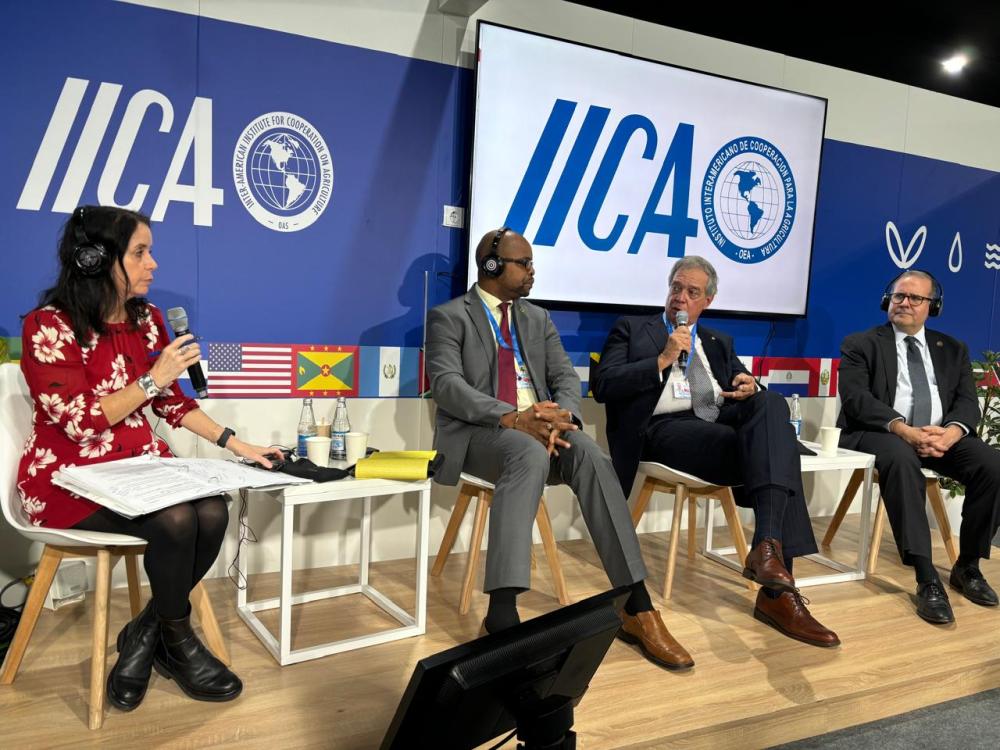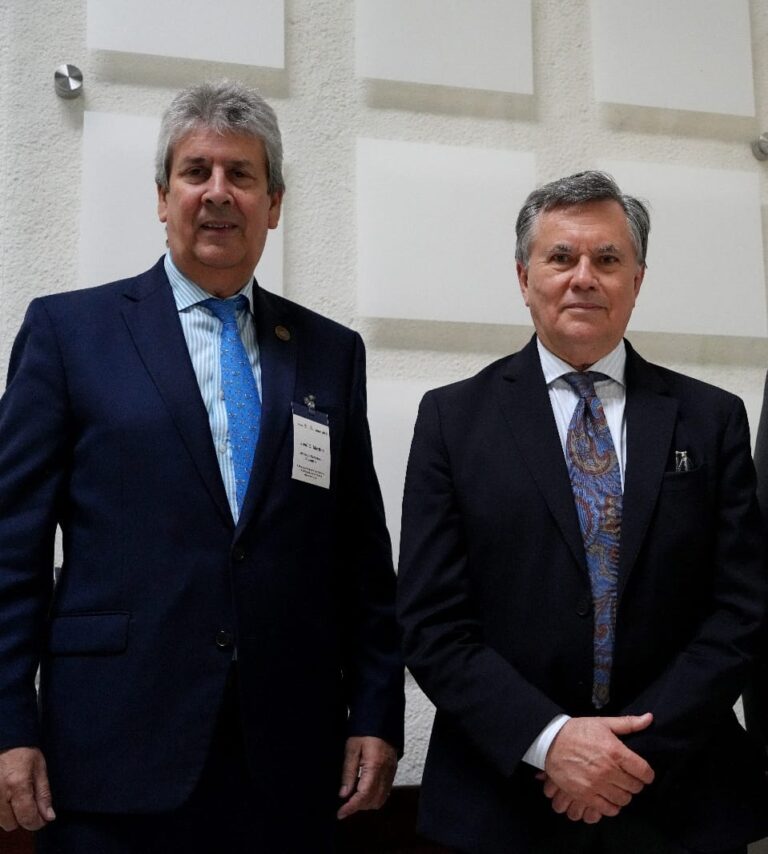Faced with this scenario, during COP29 IICA launched a groundbreaking mechanism aimed at mobilizing financial resources to strengthen producers across the continent. Lloyd Day explained that the Hemispheric Fund for Agricultural Resilience and Sustainability (FoHRSA) was developed in response to the difficulties that farmers face in accessing mechanisms that afford them protection, such as insurance, and new technologies that help them produce more with less.

Baku, Azerbaijan, 19 November 2024 (IICA). At COP29, ministers of agriculture from Latin America and the Caribbean called for rich countries to provide financing for small farmers, to underpin a key sector for food security now having to deal with the impact of increasingly frequent and extreme climate phenomena, and to reduce migration from rural areas.
Floods, droughts, heat waves and storms are severely affecting production yields and destroying infrastructure that is key to the livelihoods of rural communities, panel members warned at the pavilion that the Inter-American Institute for Cooperation on Agriculture (IICA) and its partners set up at the global forum for environmental negotiations that has attracted 65,000 people to the city of Baku.
The Home of Sustainable Agriculture of the Americas, which ensures that the voice of the continent’s productive sector is heard at the United Nations Conference on Climate Change, is making a contribution for the third consecutive time, having previously operated at COP27 in Sharm-El-Sheikh and COP28 in Dubai.
The Minister of Livestock, Agriculture and Fisheries of Uruguay, Fernando Mattos, and the Minister of Agriculture, Fisheries and the Blue and Green Economy of Dominica, Roland Royer, shared their experiences and points of view on the impact of the environmental crisis as members of a panel discussion in which the Deputy Director General of IICA, Lloyd Day, also took part.
The moderator was Danielle Nierenberg, President of the US-based Food Tank organization, which promotes the positive transformation of agrifood systems.
Mattos, who chairs the Inter-American Board of Agriculture (IABA), IICA’s highest governing body, made up of the 34 ministers of the sector in the Americas, explained that the countries of Latin America and the Caribbean have heterogeneous conditions, but all are subject to vulnerability.
“In Uruguay, in recent years, we have had very severe droughts, which have had a strong impact on the economy and production. And the droughts were followed by floods. These contrasting climate phenomena do not affect our food security, because ours is a country that produces food for a population ten or fifteen times larger than its own, but they do affect our exports, and that ends up affecting the performance of our economy,” he explained.
Royer then gave details of the situation in Dominica and on other Caribbean islands: “The impact of climate change is severe. We are in the cyclone season, from June to December. These are six months in which we are highly vulnerable. In 2017, for example, we had Hurricane Maria, which caused severe damage in Dominica. And this year, another hurricane greatly affected Jamaica, Saint Vincent and the Grenadines and Grenada, among other Caribbean countries. This shows how exposed we are.”
The minister from Dominica, an island nation of about 72,000 people, said weather events were a real threat to food security in the Caribbean, as farmers had to deal with not only hurricanes, but also longer dry seasons and changing rainfall patterns.
“All these challenges discourage farmers, who in some cases abandon their fields,” he said.
IICA Deputy Director General Lloyd Day acknowledged that today floods, droughts and heat waves affect all countries, from the north to the south of the Americas. “Even countries where there was always an abundance of water are now facing scarcity,” he said.
In that regard, he reported that IICA is working with ministers to promote public policies and strengthen science and innovation systems to deal with the phenomena.
“We came to COP 29,” he added, “to raise the voice of farmers in the Americas. The average person thinks that food comes from the supermarket; that is why we think that agriculture should have a presence here. Most of the pavilions say that agriculture is a problem, but we have come here to say that we are part of the solution, because we are the only productive sector that can sequester carbon while ensuring food security.”
Economic and social sustainability
During the discussion with Danielle Nierenberg, the ministers of agriculture and the IICA Deputy Director General analyzed in depth the main aspects of the relationship between food security and climate change, and underlined the fact that much work remains to be done to make agricultural production more resilient.
“Sustainability is not only environmental, but also economic and social. A producer who has to deal with extreme weather events often ends up abandoning the land. And that has a huge social impact, since migration from the countryside to the city implies the loss of cultural identity and traditional production systems,” Mattos commented.
“If we do not support small farmers, the climate crisis itself will make the process of the concentration of land and production even worse. The market alone does not solve things. The State must be involved and developed countries must meet their financing commitments,” he added.
In Dominica, meanwhile, farmers are losing markets due to falling yields, which discourages them from investing in their production units, Royer said.
“Caribbean countries do not emit greenhouse gases and therefore do not cause climate change. However, we suffer the consequences and receive no compensation. We need a specific fund for food security. I ask countries to fulfil their commitments and responsibilities,” he concluded.
Faced with this scenario, during COP29 IICA launched a groundbreaking mechanism to mobilize financial resources to strengthen producers across the continent. Lloyd Day explained that the Hemispheric Fund for Agricultural Resilience and Sustainability (FoHRSA) was developed in response to the difficulties that farmers face in accessing mechanisms that afford them protection, such as insurance, and new technologies that help them produce more with less.
“This has been called the ‘Financing COP.’ We need to shake up this forum to focus on the situation of food and agriculture. We need a global commitment to financing for farmers,” Day concluded.
More information:
Institutional Communication Division.
comunicacion.institucional@iica.int











